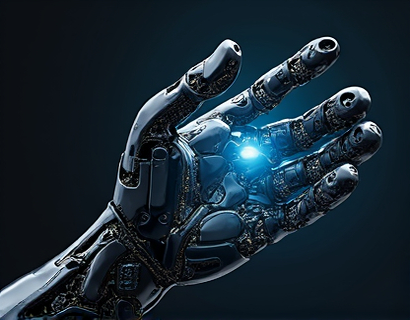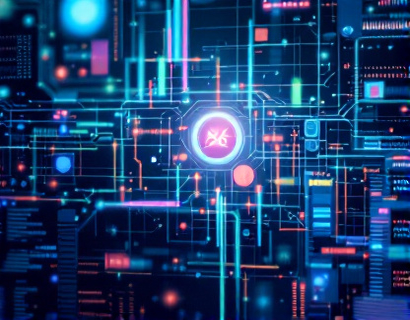Revolutionizing Digital Engagement: The Power of Crypto and AI
The intersection of cryptocurrency and artificial intelligence (AI) is giving rise to a new era of digital innovation, transforming the way we interact online. This synergy is not just about combining two cutting-edge technologies; it's about creating a more secure, personalized, and engaging digital experience. For tech enthusiasts and professionals, understanding this convergence is crucial as it holds the key to the future of digital interactions.
The traditional digital landscape is characterized by centralized systems, vulnerable to hacks and data breaches. The introduction of blockchain technology changes this paradigm by providing a decentralized, transparent, and secure framework. Blockchain's inherent properties ensure that data is immutable and tamper-proof, significantly reducing the risk of fraud and cyber attacks. This foundation is essential for building trust in digital environments, especially as more aspects of our lives move online.
Enhancing Security with Blockchain
One of the most significant advantages of integrating blockchain into digital platforms is enhanced security. Each transaction on a blockchain is verified by multiple nodes in the network, making it extremely difficult for any single entity to manipulate the data. This decentralized verification process ensures that user data and transactions are secure and transparent. For instance, in the context of digital identity management, blockchain can provide a secure and private way to verify identities without the need for centralized databases that are often targeted by hackers.
Moreover, smart contracts on the blockchain automate and enforce contractual obligations without the need for intermediaries. This not only reduces costs but also minimizes the risk of human error and fraud. In the realm of digital payments, blockchain-based systems can offer faster, cheaper, and more secure transactions, which is particularly beneficial for cross-border payments where traditional methods are slow and expensive.
Personalization through AI
While blockchain provides a secure backbone, AI brings the element of personalization to digital experiences. AI algorithms can analyze vast amounts of data to understand user preferences, behaviors, and patterns. This insight allows for highly personalized content and services tailored to individual needs. For example, recommendation engines powered by AI can suggest products, articles, or services based on a user's past interactions, significantly enhancing user engagement and satisfaction.
Personalization extends beyond content recommendation. AI can also optimize user interfaces and experiences, adapting to the user's preferences in real-time. This dynamic adjustment ensures that users have a seamless and intuitive interaction with digital platforms, reducing friction and increasing retention rates. In the context of e-commerce, AI-driven chatbots can provide instant customer support, answering queries and resolving issues efficiently, further enhancing the user experience.
Synergy of Blockchain and AI
The true power of combining blockchain and AI lies in their synergistic effects. Blockchain's security and transparency complement AI's data-driven capabilities, creating a robust framework for digital innovation. For instance, AI models can be trained on data stored on a blockchain, ensuring that the training data is tamper-proof and reliable. This is particularly important in industries like finance and healthcare, where data integrity is paramount.
Another area where blockchain and AI converge is in the realm of decentralized applications (dApps). dApps leverage blockchain for decentralized governance and AI for intelligent decision-making. This combination allows for the creation of applications that are not only secure and transparent but also highly adaptive and responsive to user needs. In the context of social media, a decentralized platform powered by blockchain and AI can offer users more control over their data and a more authentic social experience, free from the algorithms that often manipulate content visibility.
Use Cases in Various Industries
The potential applications of blockchain and AI are vast and varied, spanning multiple industries. In the financial sector, blockchain-based trading platforms can use AI to predict market trends and optimize trading strategies, while ensuring that all transactions are secure and auditable. In the healthcare industry, patient data can be securely stored on a blockchain, with AI algorithms analyzing this data to provide personalized treatment recommendations and predict health outcomes.
In the realm of supply chain management, blockchain can provide end-to-end traceability, ensuring that products are authentic and ethically sourced. AI can optimize logistics and inventory management, reducing costs and improving efficiency. For content creators, blockchain can ensure fair compensation through transparent royalty distribution, while AI can help in content creation and curation, providing users with relevant and high-quality content.
Challenges and Considerations
Despite the numerous benefits, the integration of blockchain and AI is not without challenges. One of the primary concerns is scalability. Blockchain networks, especially those using proof-of-work consensus mechanisms, can be slow and resource-intensive. However, the development of more efficient consensus algorithms and layer 2 solutions is addressing these issues, making blockchain more scalable and practical for widespread use.
Another challenge is the regulatory landscape. As blockchain and AI technologies evolve, regulatory frameworks are still catching up. Ensuring compliance while innovating is crucial for the adoption of these technologies. Transparency and ethical considerations are also paramount, as the misuse of AI, such as biased algorithms or privacy violations, can undermine trust in these systems.
Future Prospects
The future of digital engagement through the synergy of blockchain and AI is promising. As technology continues to advance, we can expect more seamless and intuitive interactions. The development of interoperable blockchain platforms will enable different systems to work together, creating a more connected and cohesive digital ecosystem. AI advancements, particularly in natural language processing and machine learning, will further enhance personalization and user experience.
Moreover, the rise of Web 3.0, a decentralized internet powered by blockchain, will redefine how we interact online. In this new paradigm, users will have greater control over their data and digital identities, with AI-driven services providing personalized and secure experiences. The convergence of these technologies will not only transform individual user experiences but also reshape industries and economies.
For tech enthusiasts and professionals, staying informed about these developments is essential. The intersection of blockchain and AI is a rapidly evolving field, offering endless opportunities for innovation and growth. By understanding and leveraging these technologies, we can build a more secure, personalized, and engaging digital world.










































